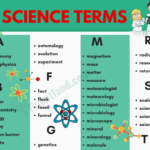Science Terms That Start With S
1. Solar system
2. Sedimentary rock
3. Sublimation
4. Solution
5. Stem cells
6. Seismology
7. Synthesis
8. Symbiosis
9. Species
10. Subatomic particles
11. Static electricity
12. Strong nuclear force
13. Supernova
14. Speed of light
15. Speciation
16. Synaptic transmission
17. Solar radiation
18. Stratigraphy
19. Surface tension
20. Sonar
21. Stratification
22. Salinity
23. Supernatant
24. Serotonin
25. Superconductor
26. Supernumerary
27. Symbiont
28. Spectrum
29. Skeletal system
30. Species diversity
More About Science Terms That Start With S
Welcome to the fascinating world of science! In this article, we will explore a variety of scientific terms that all begin with the letter “S”. Science is an ever-evolving field that covers a vast range of branches and disciplines, each with its unique set of principles, theories, and vocabulary. By examining these terms, we can gain a deeper understanding of the world around us and the intricate processes that shape our existence.
One of the most fundamental concepts in physics is “Speed”, which describes how fast an object is traveling over a specific period of time. Speed is defined as the distance traveled divided by the time it takes to cover that distance. It is a scalar quantity, meaning it is described by a magnitude only, without any direction. Understanding speed is essential in various scientific fields, including astronomy, engineering, and sports science.
Another essential scientific term beginning with an “S” is “Species”. In biology, a species is defined as a group of organisms that share similar characteristics and possess the ability to breed and produce fertile offspring. This concept is essential for understanding the diversity of living things on our planet. Scientists classify species to identify and categorize different organisms, enabling a better understanding of their evolutionary history and ecological relationships.
Moving on to the field of geology, “Seismology” is a scientific discipline that focuses on the study of earthquakes and seismic waves. Seismologists use specialized instruments called seismographs to measure and analyze seismic activity. By studying earthquakes, scientists gain insights into the Earth’s structure, tectonic plate movements, and potential risks associated with seismic events. Seismology plays a crucial role in assessing and mitigating earthquake hazards, allowing for better preparation and response strategies.
In the realm of chemistry, “Solubility” refers to the ability of a substance to dissolve in a solvent. It is a fundamental property that influences numerous chemical reactions and processes. Understanding solubility is vital in fields such as pharmaceuticals, environmental science, and material science. Scientists use solubility to predict and control the behavior of substances in various contexts, helping to unlock new discoveries and improve existing technologies.
Moving to the domain of astronomy, “Supernova” is a term that ignites curiosity and wonder among scientists and stargazers alike. A supernova is a powerful and catastrophic explosion that occurs when a massive star reaches the end of its life cycle. This extraordinary event releases an enormous amount of energy, outshining entire galaxies momentarily. Supernovae play a vital role in the synthesis of heavy elements and the dispersal of enriched materials into space, which in turn contributes to the formation of new stars and planetary systems.
These are just a few examples of the many scientific terms that begin with the letter “S”. Science encompasses an extensive range of disciplines, from physics and biology to geology and chemistry, each with its rich vocabulary. Through a greater understanding of these terms, we can foster a deeper appreciation for the intricacies and marvels of the natural world. Stay tuned as we delve further into the world of science and uncover more fascinating terms starting with the letter “S”.
Science Terms That Start With S FAQs:
1. Q: What is science?
A: Science is a systematic study of the physical and natural world through observation, experimentation, and analysis.
2. Q: What is a scientific method?
A: The scientific method is a series of steps followed in order to acquire knowledge, including making observations, forming a hypothesis, conducting experiments, analyzing data, and drawing conclusions.
3. Q: What is a hypothesis?
A: A hypothesis is a proposed explanation or prediction based on limited evidence, serving as a starting point for further investigation in scientific research.
4. Q: What is a species?
A: In biology, a species is a group of living organisms that can interbreed to produce fertile offspring. They share common characteristics and occupy a specific ecological niche.
5. Q: What is a solar system?
A: A solar system is a collection of planets, moons, asteroids, comets, and other celestial objects orbiting around a star known as the Sun. Our solar system consists of eight planets, including Earth.
6. Q: What is a sedimentary rock?
A: Sedimentary rock is a type of rock that forms from accumulated sediments, such as sand, clay, and organic matter, which are compressed and cemented together over time.
7. Q: What is the theory of evolution?
A: The theory of evolution proposes that species change over time through the process of natural selection, leading to the diversity of life on Earth.
8. Q: What is a supernova?
A: A supernova is a powerful explosion that occurs at the end of a star’s life cycle, resulting in the release of an enormous amount of energy and creating elements heavier than iron.
9. Q: What is a solenoid?
A: A solenoid is a coil of wire that carries an electric current and produces a magnetic field. It is commonly used in various applications, such as electromagnets, relays, and speakers.
10. Q: What is a stem cell?
A: A stem cell is an undifferentiated cell capable of developing into different cell types in the body. They play a crucial role in growth, tissue repair, and regeneration.

















